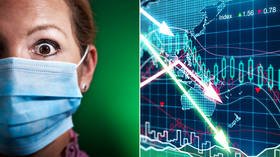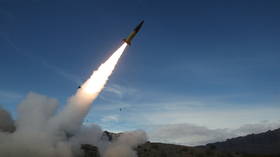Fear fueled by speculation & doomsday scenarios over coronavirus spread poses greater threat to global economy than the epidemic

The impact of the coronavirus outbreak on the global economy is potentially great but the good news is that this danger is containable if we recognize that fear itself has become a significant economic factor.
The report of the first death from the coronavirus outside China (in the Philippines) has intensified fears that we are on the verge of a pandemic which could cause a global economic recession. Financial markets have been rattled. Speculative predictions of worst-case scenarios suggest a world GDP negative impact of possibly 1.8 percent to 6 percent.
With speculation and doomsday scenarios being fueled by every new announcement of deaths or new outbreaks, it is important to distinguish what we can be sure of, and what is mere conjecture or exaggeration. This will allow us to maintain a grip on reality. For if there is one thing that this crisis has brought to the fore, it is how fear can become an economic force in itself, which can drive an irrational rather than a measured approach to mitigating the risks we face.
Also on rt.com Why the coronavirus is a real threat to China's economyWhat we can be sure of
With an official lockdown affecting more than 50 million people, consumer spending on restaurants, hotels and entertainment venues in China has plunged. But compared to the 2002/2003 SARS outbreak, the global economic effects of the coronavirus are likely to be more severe still. Simply put, China is much bigger and more intertwined with the global economy. And it is also more vulnerable than it was 17 years ago.
In 2003, China represented only about 7.5 percent of world GDP. Today, it represents more than 20 percent. Since the global financial crisis of 2007-09, China has been the engine of global growth. It now forms a much greater part of the world economy, accounting in 2018 for 27 percent of global manufacturing. Any negative and short-term economic impact on China is likely to have more global consequences that it would have had in 2003.
For example, China’s international air traffic was only about six million people in 2000, while it was almost 661 million people in 2018; Chinese tourism accounts for a large part of tourism regionally: 30 percent in Thailand and 15 percent in Australia.
China has also become a major part of global value chains, accounting for about 80 percent of raw pharmaceutical ingredients sold to manufacturers, for example. Hubei Province together with nearby Shanghai account for about 12 percent of China’s car and truck output. Delaying the operations of Honda, Toyota, Renault-Nissan-Mitsubishi and Volkswagen to a five-day workweek, for example, would result in 150,000 lost units. The closure of outlets in China by big brands like McDonald’s, KFC, IKEA, Starbucks and Apple together with the cutting of flights by British Airways, Virgin Atlantic, American and United will have short-term impacts on China and these companies.
Enforced manufacturing closures will impact supply chains. Already Apple CEO Tim Cook has warned investors about possible negative impacts of supply chain interruptions for products that are sold in US stores and around the world.
Also on rt.com Western media slamming China for ‘authoritarian’ response to coronavirus is just latest excuse to attack US’ biggest rivalChina’s lockdown has already reduced commodity prices for palm oil and base metals, reducing demand and thus negatively impacting the economies of countries that rely on these exports. The price of Brent crude, the global benchmark oil price, had slipped to a five-month low, while the price of gold has risen to its highest level for almost seven years.
Finally, both China and the world economy are more vulnerable today. China has much higher debt and, together with the impact of the trade war with the US, its growth has been steadily slowing down for a number of years. It has a much weaker starting point to face such a crisis.
What we cannot be sure of
First, it is not possible to know what longer-term impacts any of these developments will have on global growth, trade and global value chains. While previous epidemics like SARS in 2003 registered very little impact globally – between 2001 and 2005, China’s GDP grew impressively from 8.3 percent to 11.4 percent – Beijing’s position in the global economy today means the impact could be higher, but by how much remains speculative.
A more important short-term question is how China’s heavily indebted non-financial corporations (especially in the manufacturing sector) will cope with periods of lockdown. The debt load of these companies has ballooned over the past 20 years to more than 150 percent of GDP. They rely on high economic growth to keep servicing this debt. If this high growth levels off, even for a relatively modest short period, such highly indebted companies could find it difficult to honor their obligations without massive government support. The Chinese central bank might be forced to pump liquidity into the system, although then it would also risk (possibly much) higher inflation. The longer-term impact of this is difficult to predict.
Also on rt.com ‘All US has done could only spread fear’: China slams Washington for ‘stoking panic’ against Beijing over coronavirusThe final big unknown, and which brings us back to the subjective question, is whether this uncertainty will foster an increased mood of caution in business and consumer confidence. Business commitments, investment and spending decisions could be postponed.
It is impossible to predict how today’s risk-averse businesses and governments will fashion a sustained response to the crisis. But what we can be fairly certain of is that the culture of fear across the West worryingly predisposes businesses and governments to imagined worst-case scenarios as inevitable, even despite past experiences.
This would not be a rational risk management strategy. The coronavirus does not have a predetermined path that cannot be changed by human intervention. Not only is an anti-virus being developed at unprecedented speed, but crises like these are not only a real threat – they contain economic opportunities for growth too.
Consumers might be forced to stay indoors and postpone holidays or the purchase of a new mattress. But consumer demand can be rephased over time. Staying at home means eating more from home, watching more online films, the purchase of boardgames, etc. Food and agriculture and retail can thrive as a result. Face-mask manufacturers, producers of detergents and anti-bacterial hand sprays, to name a few, will also thrive. Closed factories can rapidly recover from temporary disruptions, so value-added is less affected over a year. The race to develop an anti-virus will be a boom to the pharmaceutical industry.
In other words, if fear overwhelms society, it becomes a determining economic factor in itself. Locking down cities and factories is a rational initial response. It will hopefully help to contain the virus in the immediate term. But assuming a worst-case scenario as inevitable undermines the belief that we can influence outcomes, that we can contain and defeat this new threat. Roosevelt’s warning that the only thing we should fear is fear itself could not be more apposite today.
Think your friends would be interested? Share this story!
The statements, views and opinions expressed in this column are solely those of the author and do not necessarily represent those of RT.












